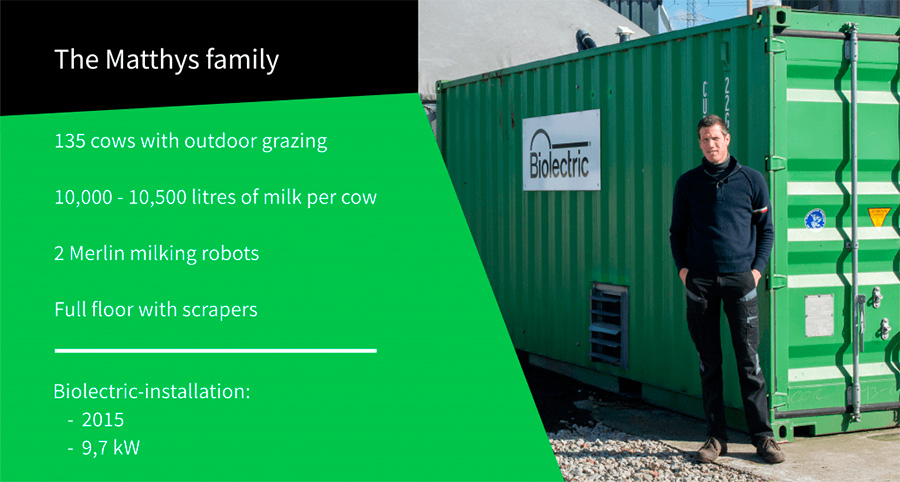- English

In the middle of the open fields in Eeklo, East Flanders, we find the Matthys family farm. It is a farm with 135 dairy cows that together produce roughly 1.4 million litres annually. In cooperation with Friesland Campina, they practice grazing on the farm.
In 2015 they invested in a new barn for the cows. The barn contains 2 milk robots that ensure that the cows are milked three times a day. Furthermore, it was decided to install a full floor with manure scrapers. The choice for a scraper that scrapes off fresh manure every hour and a half was a conscious one. Besides the comfort of the animals, the pocket digester was the driving force. “Fresh manure is hugely beneficial in the energy production process. Otherwise, you should realize that a lot of biogas potential is lost.”.
Since 2015, the Matthys family has been using a 9.7 kW installation. “At that time I did not have 135 cows yet, so a smaller installation was the most suitable at that time. Now a 22 kW installation would certainly be a possibility.”.
The main reasons why the Matthys family opted for a Biolectric installation
+ Self-sufficiency in heat and electricity
+ Digestate as a strong alternative to artificial fertilisers
+ Ease of maintenance
The answer to high energy prices
With today’s high energy prices, circular farming is increasingly seen as the future. Joeri is convinced of this too. “With the number of cows I have here, I could install a bigger installation. The electricity and heat generated by the installation now is used entirely for running the farm. “The big advantage is that the energy supply is constant. With solar panels and wind energy, there are often times when there’s no energy production.”
The roof of my digester has no insulation as most Biolectric installations do nowadays. Nevertheless, I save more than 2/3 of my energy consumption per year. My consumption is about 80 MW per year and the installation is responsible for about 60 MW of that. Moreover, the digestate that I have left over after the fermentation process is easier to apply and it also acts more quickly on the soil.
Less than 15 minutes a day
In terms of maintenance, everything can be combined with the daily work on the farm. “Generally speaking, I don’t have much work to do on maintenance. Every day, I spend 5 to 10 minutes checking the installation. And I change the oil in the engine every 400 hours. For what I save in energy and manure costs, the time investment is well worth it.
The technology has proven itself on the farm for more than 7 years. In the meantime, the investment has been fully recouped. “If I was faced with the same choice again, I wouldn’t hesitate.
More information: www.biolectric.be/en/